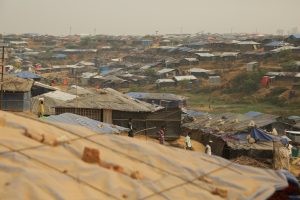A prominent Rohingya leader has been shot and killed by unknown assailants in a refugee camp in southern Bangladesh, highlighting the daunting obstacles facing the resolution of the refugee crisis.
Mohibullah, the head of the Arakan Rohingya Society for Peace and Human Rights (ARSPH), was reportedly shot and killed by unidentified gunmen in Kutupalong camp in Cox’s Bazar.
“Seven or eight assailants shot at Mohibullah outside his office after the evening prayers at around 8.30 p.m.,” a Rohingya refugee who saw the attack told Turkey’s Anadolu news agency. “There were at least five gunshots. Mohibullah was hit three times on the chest. We rushed him to the MSF (Doctors Without Borders) hospital in the camp, but the doctor on duty said he was already dead.”
Kutupalong and the other camps around Cox’s Bazar are home to around 1 million Muslim Rohingya, most of whom fled Myanmar in August 2017, when the Myanmar military launched a brutal offensive in the northern part of Rakhine State. Justified as a response to scattered attacks by Muslim Rohingya militants, the attack, which United Nations investigators later said showed “genocidal intent,” saw soldiers and local proxies raze villages, shoot and rape civilians.
It also drove more than 700,000 people over the border into Bangladesh, where they joined a quarter of a million who had fled Rakhine State earlier.
As head of the ARSPH, one of the largest community groups that were established after the exodus of 2017, the 46-year-old Mohibullah worked tirelessly to generate political and financial support for the Rohingya refugees in Bangladesh, in which capacity Mohibullah was invited to speak at the White House and the U.N. Human Rights Council.
The group also led efforts to document mass atrocity crimes against Rohingya in Myanmar, evidence that may prove crucial in any future prosecution of leading members of the Myanmar military and government.
But as Reuters news agency reported in 2019, Mohibullah had faced increasing opposition, especially from militants and religious conservatives in the camps. Among them are the Arakan Rohingya Salvation Army, whose attacks on security posts in 2017 were the pretext for the military’s violent “clearance operation.”
This opposition included death threats. “Mohibullah is a virus of the community,” read one threatening WhatsApp message that the activist shared with Reuters in 2019. “Kill him wherever he is found.”
In a statement today, Meenakshi Ganguly, South Asia director at the U.S.-based rights group Human Rights Watch, described his killing as “a stark demonstration of the risks faced by those in the camps who speak up for freedom and against violence.”
“Mohib Ullah’s death undermines not only the struggle of Rohingya refugees for greater rights and protection in the refugee camps, but also their efforts to safely return to their homes in Myanmar,” she said. “Bangladesh authorities should urgently investigate Mohib Ullah’s killing along with other attacks on Rohingya activists in the camps.”
The assassination also reflects the increasing danger and instability in the camps themselves, supposedly transient settlements whose dismantlement is nonetheless very far off.
While many Rohingya are willing to return to Myanmar with the proper guarantees for their safety and basic rights, the situation in Rakhine State has been far from amenable. As Ana Salvá noted in an article for The Diplomat today, the lack of progress more than four years since the 2017 assaults is taking a growing mental toll on many of the camps’ inhabitants.
The situation has become even less hospitable since February, when the Myanmar military – the very party responsible for their persecution and expulsion – overthrew the elected government and seized power. With the murder of one of the most tireless advocates for the voluntary, safe, and dignified return of Rohingya refugees to their homes in Myanmar, this goal now looks further away than ever.

































